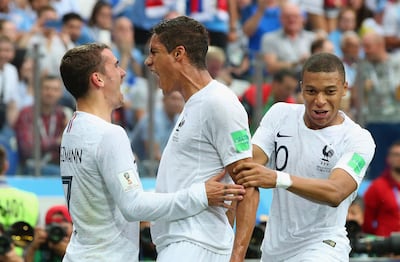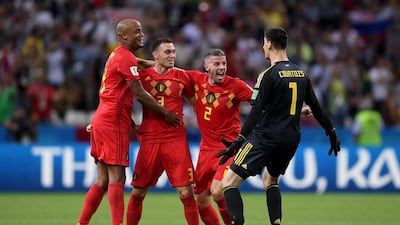The phrase feels slightly discredited. Many of the supposed golden generations did not strike gold.
Several fell some way short, most obviously England’s serial quarter-finalists of the 2000s.
Perhaps the irony in the World Cup semi-finals is that England are the anomaly, the one team who, a few weeks ago, few described as having any kind of golden generation.
Not like France and Belgium. There has long been the sense that theirs are particularly gifted groups. Rewind a few years and there were plenty of predictions that either was future Euro 2016 winners.
Perhaps the eventual verdict will be that they were two years out. Perhaps, though, the description will never be justified by results.
Thus far, semi-final rivals have certain similarities. Both were quarter-finalists in the 2014 World Cup, making fairly tame exits, to Germany and Argentina respectively.
______________
Read more
World Cup 2018 semi-final predictions: Belgium defeat France as England beat Croatia
After Brazil 'miracle', Belgium ready for 'even tougher' World Cup assignment against France
Limp end to Suarez and Uruguay hopes as France march on at World Cup
______________
The sense of occasion felt too big for each. Perhaps it came too soon for the younger players in either camp.
Yet there was a greater sense of anti-climax in Euro 2016. Exits came to supposedly inferior opposition, Belgium capitulating against Wales in the quarter-finals and France contriving to lose a final on home soil to a less talented Portugal team, courtesy of a goal from the undistinguished striker Eder.
Biennial opportunities form part of a greater narrative. Each has had to wait two years for redemption. Lose on Tuesday and they will have to wait another four for a chance on the global stage.
As Belgium is a country of 11 million people, as they failed to even reach the 2006 and 2010 tournaments, the possibility is it may never emerge again. Key parts of their team are older than their French counterparts.
Vincent Kompany has already thought of international retirement. Their premier centre-backs – Jan Vertonghen, Toby Alderweireld, Thomas Vermaelen and Kompany – will all be at least 33 when the 2022 tournament comes along. It may be now or never for the defence.
France are different. Arguably, they have a golden generation and a half, stretching from Hugo Lloris and Blaise Matuidi in their early thirties to Kylian Mbappe in his late teens.
There are reasons to believe that Les Bleus will be better in four years’ time, that at least some of Mbappe, Thomas Lemar, Anthony Martial, Ousmane Dembele, Corentin Tolisso, Samuel Umtiti, Benjamin Pavard, Benjamin Mendy and Lucas Hernandez will be superior players in 2022. Their age profile suggests so.

Yet the promise of a brighter tomorrow can be dangerous. Opportunities are not untold. France and Belgium cannot keep squandering chances, as Sven-Goran Eriksson’s England did.
They were the inverse alchemists, turning potential gold into base metal.
Perhaps it is pertinent that the golden generation tag was first attached to the Portugal side of Luis Figo, Paulo Sousa and Rui Costa. They were nearly men. It was a tainted tag.
And instead the role models should be the France side of 1998, the Spain team of 2010 or the German group of 2014: the golden generations who actually won the World Cup.
They produced either a defining performance – and Germany’s 7-1 win over Brazil four years ago was the most emphatic example – or pivotal moments that altered a nation’s footballing history. Carles Puyol’s winner in Spain’s semi-final against Germany seemed a case in point.
Zinedine Zidane’s two-goal display in France’s final win two decades ago configured a new status on him. It passed overlooked that his tournament before then had included a sending-off and a suspension. He became the figurehead for a generation and a nation.
It is a fate that could await one of the French and Belgians. They have produced potential turning points, things that could assume a greater importance with the sheen of silverware, whether Mbappe’s evisceration of Argentina or Kevin de Bruyne’s rifled goal against Brazil.
Nacer Chadli’s injury-time winner against Japan could become Belgium’s version of Laurent Blanc’s 1998 extra-time decider against an obdurate Paraguay, or not.
At some stages, individuals have assumed the responsibility for putting the goal into golden generations. For France and Belgium, each knowing they would be the favourite in a final with Croatia or England, the class of 2018 stand on the precipice.
This could be their era. It has long promised to be.


